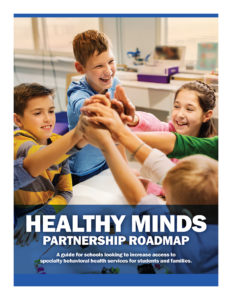
The Blue Cross of Idaho Foundation for Health and the Southwest Health Collaborative have teamed up to help communities across the Treasure Valley and across the state work locally to address youth behavioral health through the Healthy Minds Partnership.
Youth Behavioral Health: A Challenge for All
Suicide, depression, and anxiety: these issues are no longer just the purview of the therapist’s office but more and more are becoming issues that teachers, principals, and families are struggling to address among our most vulnerable community members, children and young adults. When I talk to teachers and school staff, I hear less about test scores and more about dealing with student trauma, talking to students about cutting behaviors, and coping with substance use issues at home.
Increasingly, schools, parents, and neighbors across Idaho are grappling with what they can do to address the mental and emotional concerns of children and young adults. Violence, self-harm, and mental health issues are becoming more central to the not only behavioral health providers but also educators, families, and other community members. Meanwhile, the entire state of Idaho is a behavioral health provider shortage area, making access to services to help address these concerns exceptionally challenging.
 This means that many students are not receiving the necessary care they need to have the healthy minds needed to thrive at school, at home, and in their futures. At the same time, schools are doing what they can to respond to the challenges faced by students by supporting behavioral health programs.
This means that many students are not receiving the necessary care they need to have the healthy minds needed to thrive at school, at home, and in their futures. At the same time, schools are doing what they can to respond to the challenges faced by students by supporting behavioral health programs.
However, schools cannot do this work alone.
The good news is more and more organizations across communities are coming together to address youth behavioral health through a variety of innovative partnerships.
A Roadmap for Something Better
One such collaboration is the Healthy Minds Partnership. In the fall of 2016, the Southwest Health Collaborative’s Behavioral Health Workgroup began thinking about how they could go “upstream,” helping children and youth access behavioral health support before reaching a crisis. Inspired and informed by the innovative work of Terry Reilly Health Services and Lewis and Clark Elementary in Caldwell, the group (including representatives from Lifeways, Terry Reilly Health Services, Saint Alphonsus Medical Group, Southwest District Health, and Optum) began thinking about how to support students in Southwest Idaho and across the state.
 The group began by asking how they might support a local school district. In talking with Nampa School District, it was clear there was a major need for accessible therapy services for students. Schools wanted full-time specialty clinicians on-site at the school to address the long-term needs of students who might otherwise struggle to access community services due to time away from class or transportation challenges.
The group began by asking how they might support a local school district. In talking with Nampa School District, it was clear there was a major need for accessible therapy services for students. Schools wanted full-time specialty clinicians on-site at the school to address the long-term needs of students who might otherwise struggle to access community services due to time away from class or transportation challenges.
The group set to work to begin developing an innovative solution to meet the school’s needs.
A variety of partners were involved in the planning process, lending their expertise to the development of a system to create a private-public partnership between a behavioral health agency and the local schools. Everyone from local government to specialty providers to primary care providers to payers lent a hand and participated in planning meetings, interviews, and site visits.
By the Fall of 2017, two pilot schools in the Nampa School District had full-time behavioral health clinicians on-site to support students.

The Southwest Health Collaborative supported the development of partnerships between schools and behavioral health clinicians, and with guidance from the Blue Cross of Idaho Foundation for Health, the group began documenting key considerations, ultimately creating a “roadmap” for other schools and communities to develop similar partnerships. This Healthy Minds Partnership Roadmap contains everything from how to structure a memorandum of understanding (MOU), to what to look for in a clinician, to tips and tricks for school counselors and clinicians to work together.
The purpose of the roadmap is to provide guidance to other agencies and schools around the state to begin structuring their own partnerships locally.
Scaling Success
The partnership model is already producing remarkable results. In some schools, there has been a significant reduction in absences and in others an increase in GPA among students receiving services. Crucially, clinical depression scores are also improving with care.
Just as important as the quantitative data we have collected are the stories we hear.
 One counselor told the group about a student that was unable to go to school more than a day or two per week last year due to severe anxiety. With services from the school partner, the same student has had only one or two absences this year.
One counselor told the group about a student that was unable to go to school more than a day or two per week last year due to severe anxiety. With services from the school partner, the same student has had only one or two absences this year.
At another school, a principal shared she has seen a marked change in the types of behavioral disruptions among students who are receiving services from the school partner. Student disruptions are becoming less severe and students are more productive. This makes an impact for the student receiving behavioral health services as well as for his or her classmates and teachers.
Finally, because of the success of the program in just one year, Nampa School District made the decision to expand the school partner model from two schools to eight this year.
Today, the workgroup is ready to take the next step and share the opportunity for this work with partners across the state to help support student success. Through the roadmap and limited technical assistance opportunities, we hope to help schools and communities realize the success we have seen in Nampa.
 Prior to beginning this work, I never realized how hard schools work to meet the academic needs of students as well as their social, emotional, and other support needs. School teachers, administrators, counselors, and other support staff are among the most dedicated professionals that I have ever met in my life. Schools cannot, nor should they have to, support youth behavioral health alone. Likewise, behavioral health clinicians benefit from partnering with community agencies to better address the needs of their patients.
Prior to beginning this work, I never realized how hard schools work to meet the academic needs of students as well as their social, emotional, and other support needs. School teachers, administrators, counselors, and other support staff are among the most dedicated professionals that I have ever met in my life. Schools cannot, nor should they have to, support youth behavioral health alone. Likewise, behavioral health clinicians benefit from partnering with community agencies to better address the needs of their patients.
Through collaborative efforts, a willingness to share and learn, and a passion for cultivating healthy environments for children and young adults, we can help schools and other partners to support the needs of our students. Through healthy partnerships, we create healthy communities, and these in turn help support healthy minds.